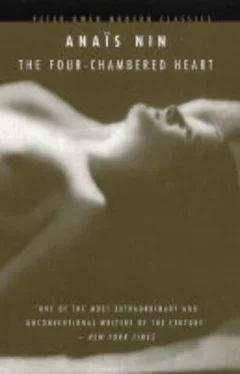Anaïs Nin - The Four-Chambered Heart
Здесь есть возможность читать онлайн «Anaïs Nin - The Four-Chambered Heart» весь текст электронной книги совершенно бесплатно (целиком полную версию без сокращений). В некоторых случаях можно слушать аудио, скачать через торрент в формате fb2 и присутствует краткое содержание. Год выпуска: 2004, ISBN: 2004, Издательство: Peter Owen Limited, Жанр: Классическая проза, Эротические любовные романы, на английском языке. Описание произведения, (предисловие) а так же отзывы посетителей доступны на портале библиотеки ЛибКат.
- Название:The Four-Chambered Heart
- Автор:
- Издательство:Peter Owen Limited
- Жанр:
- Год:2004
- ISBN:9780720611557
- Рейтинг книги:3 / 5. Голосов: 1
-
Избранное:Добавить в избранное
- Отзывы:
-
Ваша оценка:
- 60
- 1
- 2
- 3
- 4
- 5
The Four-Chambered Heart: краткое содержание, описание и аннотация
Предлагаем к чтению аннотацию, описание, краткое содержание или предисловие (зависит от того, что написал сам автор книги «The Four-Chambered Heart»). Если вы не нашли необходимую информацию о книге — напишите в комментариях, мы постараемся отыскать её.
The Four-Chambered Heart — читать онлайн бесплатно полную книгу (весь текст) целиком
Ниже представлен текст книги, разбитый по страницам. Система сохранения места последней прочитанной страницы, позволяет с удобством читать онлайн бесплатно книгу «The Four-Chambered Heart», без необходимости каждый раз заново искать на чём Вы остановились. Поставьте закладку, и сможете в любой момент перейти на страницу, на которой закончили чтение.
Интервал:
Закладка:
“You admire Jay as a painter merely because Paul admired him. He was Paul’s great hero in painting.”
“What can I say, Rango? What can I do to prove to you that I belong to you? Paul is not only far away but you know we will never see each other again, that we were not good for each other. I have completely surrendered him, and I could forget him if you would let me. You are the one constantly reminding me of his existence.”
At these moments Rango was no longer the fervent, the adoring, the warm, the big, the generous one. His face would darken with anger, and he made violent gestures. His talk became vague and formless, and she could barely catch the revealing phrase which might be the key to the storm and enable her to abate or deflect it.
A slow anger at the injustice of the scene overtook her. Why must Rango use the past to destroy the present? Why did he deliberately seek torment?
She left the table swiftly, and climbed to the deck. She sat near the anchor chain, in the dark. The rain fell on her and she did not feel it; she felt lost and bewildered.
Then she felt him beside her. “Djuna! Djuna!”
He kissed her, and the rain and the tears and his breath mingled. There was such a desperation in his kiss that she melted. It was as if the quarrel had peeled away a layer and left a core like some exposed nerve, so that the kiss was magnified, intensified, as if the pain had made a fine incision for the greater penetration of pleasure.
“What can I do?” she murmured. “What can I do?”
“I’m jealous because I love you.”
“But Rango, you have no cause for jealousy.”
It was as if they shared his illness of doubt and were seeking a remedy, together.
It seemed to her that if she said, “Jay was a bad painter,” Rango could see the obviousness of such a recantation, its absurdity. Yet how could she restore his confidence? His entire body was pleading for reassurance, and if her whole love was not enough what else could she give him to cure his doubt?
When they returned to the room the fire was low.
Rango did not relax. He found some books piled next to the wastebasket which she had intended to throw away. He picked them up and studied them, one by one, like a detective.
Then he left the ones she had discarded and walked to those aligned on the book shelf.
He picked one up at random and read on the fly leaf: “From Paul.”
It was a book on Jay, with reproductions of his paintings.
Djuna said: “If it makes you happy, you can throw it away with the others.”
“We’ll burn them,” he said.
“Burn them all,” she said with bitterness.
To her this was not only an offering of peace to his tormenting jealousy, but a sudden anger at this pile of books whose contents had not prepared her for moments such as this one. All these novels so carefully concealing the truth about character, about the obscurities, the tangles, the mysteries. Words words words words and no revelation of the pitfalls, the abysms in which human beings found themselves.
Let him burn them all; they deserved their fate.
(Rango thinks he is burning moments of my life with Paul. He is only burning words, words which eluded all truths, eluded essentials, eluded the bare demon in human beings, and added to the blindness, added to the errors. Novels promising experience, and then remaining on the periphery, reporting only the semblance, the illusions, the costumes, and the falsities, opening no wells, preparing no one for the crises, the pitfalls, the wars, and the traps of human life. Teaching nothing, revealing nhing, cheating us of truth, of immediacy, of reality. Let him burn them, all the books of the world which have avoided the naked knowledge of the cruelties that take place between men and women in the pit of solitary nights. Their abstractions and evasions were no armor against moments of despair.)
She sat beside him by the fire, partaking of this primitive bonfire. A ritual to usher in a new life.
If he continued to destroy malevolently, they might reach a kind of desert island, a final possession of each other. And at times this absolute which Rango demanded, this peeling away of all externals to carve a single figure of man and woman joined together, appeared to her as a desirable thing, perhaps as a final, irrevocable end to all the fevers and restlessness of love, as a finite union. Perhaps a perfect union existed for lovers willing to destroy the world around them. Rango believed the seed of destruction lay in the world around them, as for example in these books which revealed to Rango too blatantly the difference between their two minds.
To fuse then, it was, at least for Rango, necessary to destroy the differences.
Let them burn the past then, which he considered a threat to their union.
He was driving the image of Paul into another chamber of her heart, an isolated chamber without communicating passage into the one inhabited by Rango. A place in some obscure recess, where flows eternal love, in a realm so different from the one inhabited by Rango that they would never meet or collide, in these vast cities of the interior.
“The heart… is an organ… consisting of four chambers… A wall separates the chambers on the left from those on the right and no direct communication is possible between them…”
Paul’s image was pursued and hid in the chamber of gentleness, as Rango drove it away, with his holocaust of the books they had read together.
(Paul, Paul, this is the claim you never made, the fervor you never showed. You were so cool and light, so elusive, and I never felt you encircling me and claiming possession. Rango is saying all the words I had wanted to hear you say. You never came close to me, even while taking me. You took me as men take foreign women in distant countries whose language they cannot speak. You took me in silence and strangeness…)
When Rango fell asleep, when the aphrodisiac lantern had burnt out its oil, Djuna still lay awake, shaken by the echoes of his violence, and by the discovery that Rango’s confidence would have to be reconstructed each day anew, that none of these maladies of the soul were curable by love or devotion, that the evil lay at the roots, and that those who threw themselves into palliating the obvious symptoms assumed an endless task, a task without hope of cure.
The word most often on his lips was trouble.
He broke the glass, he spilled the wine, he burnt the table with cigarettes, he drank the wine which dissolved his will, he talked away his plans, he tore his pockets, he lost s buttons, he broke his combs.
He would say: “I’ll paint the door. I will bring oil for the lantern. I will repair the leak on the roof.” And months passed: the door remained unpainted, the leak unrepaired, the lantern without oil.
He would say: “I would give my life for a few months of fulfillment, of achievement, of something I could be proud of.”
And then he would drink a little more red wine, light another cigarette. His arms would fall at his side; he would lie down beside her and make love to her.
When they entered a shop, she saw a padlock which they needed for the trap door and said: “Let’s buy it.”
“No,” said Rango, “I have seen one cheaper elsewhere.”
She desisted. And the next day she said: “I’m going near the place, where you said they sold cheap padlocks. Tell me where it is and I’ll get it.”
“No,” said Rango. “I’m going there today. I’ll get it.” Weeks passed, months passed, and their belongings kept disappearing because there was no padlock on the trap door.
No child was being created in the womb of their love, no child, but so many broken promises, each day an aborted wish, a lost object, a misplaced unread book, cluttering the room like an attic with discarded possessions.
Читать дальшеИнтервал:
Закладка:
Похожие книги на «The Four-Chambered Heart»
Представляем Вашему вниманию похожие книги на «The Four-Chambered Heart» списком для выбора. Мы отобрали схожую по названию и смыслу литературу в надежде предоставить читателям больше вариантов отыскать новые, интересные, ещё непрочитанные произведения.
Обсуждение, отзывы о книге «The Four-Chambered Heart» и просто собственные мнения читателей. Оставьте ваши комментарии, напишите, что Вы думаете о произведении, его смысле или главных героях. Укажите что конкретно понравилось, а что нет, и почему Вы так считаете.












